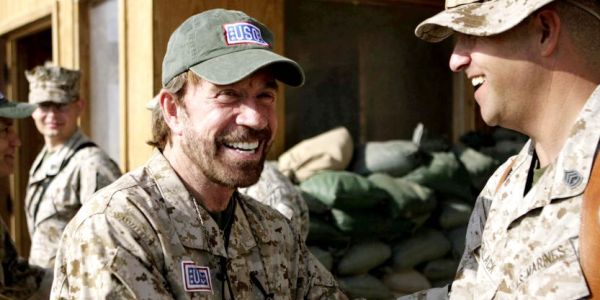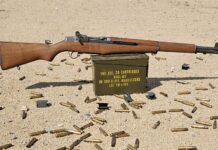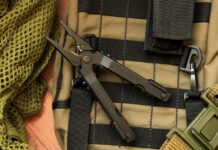 5. Chuck Norris
5. Chuck Norris
The world-champion martial artist is a movie and television star, and has spawned a whole industry around “Chuck Norris facts” (for example: “Chuck Norris doesn’t breathe, he holds the air hostage”). Yet it might not have come about had he not decided to join the Air Force after high school. Aiming for a career in law enforcement, he joined the USAF security police, and while stationed in Korea, he realized one night on duty that he couldn’t arrest a rowdy drunk without pulling his weapon. As a result, he started studying some of the local Korean martial arts, including Tang Soo Do and Tae Kwan Do, and became the first Westerner to be awarded an eighth-degree Black Belt in Tae Kwan Do. He held the world middleweight karate champion title for six years, and was named Black Belt magazine’s “Fighter of the Year” in 1969. He founded 32 martial arts schools, and was actor and fellow veteran Steve McQueen’s karate teacher.
“Before the President of the United States can declare war, Congress must have permission from Chuck Norris.”
McQueen encouraged Norris to go into acting, and after gaining attention as Bruce Lee’s opponent in “Way of the Dragon,” he starred in such films as “Good Guys Wear Black,” “Delta Force” and “Missing in Action.” He also starred in the long-running TV series “Walker, Texas Ranger.” Norris has used his success to give back to the military community, serving as a spokesman on behalf of the Veterans Administration and hospitalized veterans. On March 28, 2007, Commandant Gen. James T. Conway made Norris an honorary United States Marine.
4. Mr. T
Before he nearly pounded Rocky Balboa into submission in Rocky III, and went on to fame as B.A. Baracus on the hit TV show A-Team, Mr. T was a member of the biggest team of them all — the U.S. Army. Originally known as Laurence Tureaud, Mr. T served in the Army’s Military Police Corps in the mid-70s. In November 1975 he was awarded a letter of recommendation by his drill sergeant, and in a cycle of six thousand troops he was elected “Top Trainee of the Cycle” and promoted to Squad Leader. In July 1976 his platoon sergeant punished him by giving him the detail of chopping down trees during training camp at Fort McCoy in Wisconsin, but the sergeant did not specify how many trees that were to be cut down — so Tureaud single-handedly chopped down over 70 trees in the span of three and a half hours before being relieved of the detail.
“When you find a really tough guy, he’s not a predator. He doesn’t have to prove himself. Guys who have to pretend to be tough, they ain’t. I’m tough.”
After his discharge from the Army, Tureaud tried out for the NFL’s Green Bay Packers but failed to make the team because of a knee injury. However, his Army police training served him well in his next job, as a bouncer at Chicago nightclubs, where he began cultivating his ultra-tough “Mr. T” persona (the famous gold chains he wears were a result of picking up discarded jewelry from the nightclub every night). Perhaps the first “celebrity bodyguard,” and certainly one of the most famous, Mr. T eventually found fame in the movies and TV, and currently lives in L.A.
3. Johnny Cash
“That was the big thing when I was growing up, singing on the radio. The extent of my dream was to sing on the radio station in Memphis. Even when I got out of the Air Force in 1954, I came right back to Memphis and started knocking on doors at the radio station.”
The legendary country performer is known as the “Man in Black,” but he was also a man in Air Force blues. Fresh out of high school in 1950, Cash joined the Air Force as the Korean War began, and spent most of his four-year enlistment in Germany. Perhaps not surprisingly for a man with music in his veins, Cash was handy when it came to the rhythms of Morse code, and served as an intercept operator with the USAF Security Service.
It could be argued that if weren’t for the military, we might never have known who Johnny Cash was — coming from a poor background, he was only able to scrounge enough money together to buy a guitar once he started receiving military pay. He purchased his first guitar at the Base Exchange while stationed in Germany, and the rest is history, as they say. He also formed his first band while in the Air Force (the Landsberg Barbarians) and upon his discharge he used his GI Bill benefits to attend a radio-announcing course at a broadcasting school in Memphis.
“That was the big thing when I was growing up, singing on the radio. The extent of my dream was to sing on the radio station in Memphis. Even when I got out of the Air Force in 1954, I came right back to Memphis and started knocking on doors at the radio station.”
Although Cash’s reputation as an outspoken, hard-living rebel has overshadowed his time in service, he never forgot about where he came from, and years later, he met a young Army captain named Kris Kristofferson, who he helped become a country superstar in his own right.
2. Clint Eastwood
Long before Eastwood dared anyone to make his day as Dirty Harry, he served in the Army as a swimming instructor at Ft. Ord. As fate (and luck) would have it, his swimming skills would come in handy: one time when he was hitching a ride aboard a Navy torpedo bomber, the plane developed engine trouble and was forced to ditch in San Francisco Bay. Eastwood swam over a mile through the tide to shore, foreshadowing his own character’s watery trials in “Escape from Alcatraz.”
“I was drafted during the Korean War. None of us wanted to go… It was only a couple of years after World War II had ended. We said, ‘Wait a second? Didn’t we just get through with that?’”
After his discharge in 1953, Eastwood attended L.A. City College and studied drama under the GI Bill. From humble origins in the movie business (he started on a $75-a-week contract with Universal Studios), he eventually found international fame in “spaghetti” westerns, the Dirty Harry series, and as an Oscar-winning director.
1. Elvis Presley
It seems only fair that the man known as “the King of Rock ‘n’ Roll” should be the king of this list. Drafted by the U.S. Army just as he was experiencing a rise to stardom seldom seen before or since in popular music, Presley didn’t shirk from his duty and found himself trading in his leather jacket for combat fatigues. He entered the Army as a regular GI at Ft. Chaffee on March 24, 1958. As his famously tousled hair was shaved down to regulation length, he cracked, “Hair today, gone tomorrow.” His induction was a major event, with hundreds of overlookers and media there to witness it.
Elvis was stationed at Ft. Hood for Basic Training and was assigned to the Second Armored Division’s ‘Hell On Wheels’ unit. Later he was assigned to the Third Armored ‘Spearhead’ Division, and stationed in Friedberg, Germany — it was here that he met Priscilla Beaulieu, who would eventually become his wife. During his time in Texas and Germany, Elvis kept a low profile, although he was already wealthy enough to bring his father and grandmother to live with him off-base.
“The Army teaches boys to think like men.”
By the time he finished his Army stint, Elvis had been promoted to sergeant, and he was honorably discharged from active duty on March 5, 1960 at Fort Dix, receiving a mustering-out check of $109.54. Just prior to his exit, Elvis reflected on his experiences in an interview for Armed Forces Radio and Television: “I was in a funny position. Actually, that’s the only way it could be. People were expecting me to mess up, to goof up in one way or another. They thought I couldn’t take it and so forth, and I was determined to go to any limits to prove otherwise, not only to the people who were wondering, but to myself.”
Source Article from http://www.special-ops.org/21018/top-5-celebrities-who-were-in-the-u-s-military/



